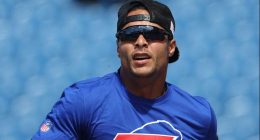Parker Posey and Michael Stuhlbarg play opposing counsel in HBO Max’s limited series The Staircase, which is based on the documentary of the same name that followed the trial of Michael Peterson following the 2003 death of his wife, Kathleen.
Because the trial itself was highly publicized at the time and was the focus of a docuseries from director Jean-Xavier de Lestrade, Posey and Stuhlbarg say they had plenty of material to work with in preparing for their roles as prosecutor Freda Black and Peterson’s defense attorney David Rudolf. While Black died in 2018, Rudolf made himself available to both actors to help gear up for the complicated courtroom scenes. Plus, both actors say, creator Antonio Campos supplied stacks and stacks of courtroom files and autopsy photos of Kathleen Peterson to assist.
Posey and Stuhlbarg talk to THR about what drew them to The Staircase, how they prepared for their respective roles and how they supported each other through the dark subject matter.
How did your involvement with the show start?
PARKER POSEY I had the pleasure of meeting Antonio at the Deauville Film Festival in 2008. Antonio had been in his 20s and he reached out to me and befriended me at some little cocktail party, and we just started talking and he invited me to his first film, After School. I was really impressed at how much of a vision he had as a filmmaker. About five years after that, I get an email from him and he’s like, “What are you doing? Let’s go hang out.” I invited him to a loft party in Tin Pan Alley, and he came with his now wife, who is also the editor of The Staircase. And he said, “I had this editor approach me with this movie idea about this documentary called The Staircase. Have you seen that?” I am so into that longform documentary, true-crime stuff … He was like, “Can you play Freda Black?” I was like, “Yeah, I can’t wait.” And then a decade later, he was like, “This is now an HBO series.” I was the first person to come on board.
MICHAEL STUHLBARG I heard about it when I was in the middle of making another project, and I had worked with Antonio before, on After School. It was a really provocative and interesting piece for its time, and very personal for Antonio. When I heard about The Staircase happening, and he wanted me to be a part of it, I jumped at the opportunity. I’d heard that Parker and Colin [Firth] and Toni [Collette] were all going to be a part of it. Everything about it sounded fantastic to me. I was also a fan of the documentary and, oddly, I had seen it a second time even before I knew that we were going to be making a show. It did captivate me.

How did you both prepare for your roles?
POSEY I read the book Written in Blood [by Diane Fanning], and Antonio sent me autopsy Xerox copies of all the blood and guts, and I kept it at a distance. I just kept listening to Freda’s voice and her accent and got to watch her on Court TV. And that’s when I heard that Michael Stuhlbarg, who’s been a favorite actor of mine since [Martin McDonagh’s play] The Pillowman, was in touch with David Rudolph, the real guy! I was like, “Oh my God, that’s amazing, he can tell me about Freda.” I’ve had a few phone calls with Candy, Freda’s friend. There’s this whole other side of her that wasn’t in the script. What happened with this, as we know, took a toll on her. [I knew] I had to really honor this woman. It was like being haunted by her.
STUHLBARG I had barely agreed to the idea of speaking with David — Antonio sent me a message and said, “Here, you guys meet.” As you said, Parker, you jump in, ready or not. In the past, when I’ve had the opportunity to meet real people that I would be playing, you have to ask forgiveness of them initially and say, “This process of getting to know each other is limited, so please forgive me if I ask a lot of stupid questions.” I flew to Charlotte and I spent a whole day with him. He made himself available to everybody if they wanted to speak about anything. Sometimes you’ll play someone who is living and you’ll have no material to get to know who they are. In this instance, there was more footage than you could ever sit through. In fact, I was completely unaware of the Court TV footage until Parker mentioned it to me, and my head exploded. At that time, this was the longest court trial in North Carolina history, over three months. There was so much information to sift through. I would just listen to David’s voice over and over again and just sort through it.
Antonio gave us this massive stack, two huge envelopes, with autopsy photos and all the papers that the defense would have had during the trial and left it to us to either look at them or not. I waited a couple of days as well, because it freaked me out. I didn’t really want to look at it much after that initial time. As Parker was excessively conscientious about wanting to honor the memory of Freda, David had only one thing that he [asked of me], which was that the portrayal of the criminal defense lawyer be as conscientious about what it is that they do — in other words, not to portray them in a manner that would be denigrating to those who practice criminal defense law, because he feels the media has been abusive to the profession as a whole.
POSEY Michael, I don’t know if I told you this or David told you, [but] the first thing that I told David was, “You should be so excited. Michael Stuhlbarg is playing you. You’ve got a real actor’s actor.”
STUHLBARG If Freda were around, she would be absolutely thrilled to have had you play her. You were extraordinary. It was a wonderful pairing of an individual to a role.
POSEY I feel the same about you. And Michael was so supportive. All of our scenes in the DA’s office, we shot in four 17-hour days. When Cullen Moss, who played [fellow prosecutor Jim Hardin], saw me as Freda, he had tears in his eyes. We just loved the charm and the brutality of being able to portray this kind of exhaustion and darkness in their friendship. I haven’t had that kind of friendship acting with someone in a long time. So by the time we got to the courtroom scenes — we shot those in five days — I was a bit nervous when I had to do things alone. But then there was one day when I had to go all out and shame Michael Peterson in public, and Freda’s closing statement was like a one-woman show. It was 45 minutes long. I remember looking over at Michael and he just looked at me and he gave me a thumbs up, and it just meant so much.

STUHLBARG You didn’t need any help, though. It was so much fun to watch you and Cullen be one amoeba. The two of you were just working together in such a beautiful manner. I have rarely seen two people just absorb so much about each other so well and so thoroughly, and you were both so perfect for those parts.
What was the most challenging scene?
STUHLBARG It’s funny because with what I remember David saying about how he practices his profession, when he’s in it, he’s in it, and when he’s not, he’s not. He drew a very distinct line between honoring his clients and also separating from them. Because of circumstances, COVID and all of that, we didn’t get the opportunity to socialize as much as we would like to, because we were all somewhat quarantining. Antonio did have these get-togethers periodically, where we could check in with each other and have meals together. Those were an absolute delight.
But to answer your question, the first thing that popped to my mind was watching Cullen suddenly improvise during some of the trial sequences. He knew his character so well, I found that he started to elaborate on some of the issues that Jim Hardin would have elaborated on during his closing statements. I felt this heat coming up in me, this competition being on the opposing counsel. It was odd because it was as if I were David watching the rival counsel showboat and elaborate much further than he was supposed to. “What the hell am I going to do? I have to meet that challenge.” And that doesn’t happen too often. I dug deep and I found something else, which didn’t make it into the [series], but that doesn’t matter. In getting to know David in the short amount of time that I got to speak with him and ask questions of him, I felt a great responsibility to honor what he asked of me and also to take all that information that we were given — which there was too much — and to try to make it my own. I found it very lonely, this job, trying to do what he did.
Interview edited for length and clarity.
This story first appeared in a June stand-alone issue of The Hollywood Reporter magazine. To receive the magazine, click here to subscribe.
Source: Hollywood






